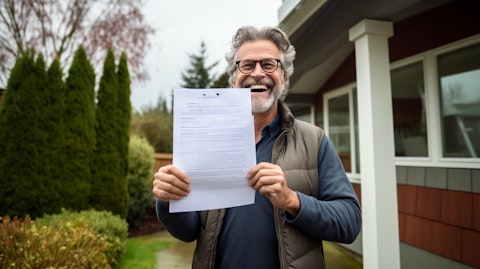HCI Group, Inc. (NYSE:HCI) Q3 2024 Earnings Call Transcript November 9, 2024
Operator: Good afternoon, and welcome to HCI Group’s Third Quarter 2024 Earnings Call. My name is Paul, and I will be your conference operator. At this time, all particioants will be in a listen-only mode. Before we begin today’s call, I would like to remind everyone that this conference call is being recorded and will be available for replay through December 7, 2024, starting later today. The call is also being broadcast live via webcast and available via webcast replay until November 7, 2025, on the Investor Information section of HCI Group’s website at www.hcigroup.com. I would now like to turn the call over to Matt Glover, Gateway Investor Relations. Matt, please proceed.
Matt Glover: Thank you, Paul, and good afternoon. Welcome to HCI Group’s Third Quarter 2024 Earnings Call. On today’s call is Karin Coleman, HCI’s Chief Operating Officer; Mark Harmsworth, HCI’s Chief Financial Officer; and Paresh Patel, HCI’s Chairman and Chief Executive Officer. Following Karin’s operational update, Mark will review our financial performance for the third quarter of 2024, and then Paresh will provide a strategic update. To access today’s webcast, please visit the Information section or of our corporate website at www.hcigroup.com. Before we begin, I’d like to take the opportunity to remind listeners that today’s presentation and responses to questions may contain forward-looking statements made pursuant to the Private Securities Litigation Reform Act of 1995.
Words such as anticipate, estimate, expect, intend, plan and project and other similar words and expressions are intended to signify forward-looking statements. Forward-looking statements are not guarantees of future results and conditions, but rather are subject to various risks and uncertainties. Some of these risks and uncertainties are identified in the company’s filings with the Securities and Exchange Commission. Should any risks or uncertainties develop into actual events, these developments could have material adverse effects on the company’s business, financial conditions and results of operations. HCI Group disclaims all the obligations to update any forward-looking statements. Now with that, I’d like to turn the call over to Karin Coleman, Chief Operating Officer.
Karin?
Karin Coleman: Thank you, Matt, and welcome, everyone. Since our last call, we have been impacted by 3 hurricanes. Hurricanes Debby and Helene occurred in the third quarter, and Milton made landfall early in the fourth quarter. These storms have affected our customers as well as our neighbors, employees, families and families in Florida, Georgia, South Carolina and North Carolina. Our hearts and prayers go out to everyone impacted. These three events have produced more than 10,000 claims, and we expect to pay hundreds of millions of dollars to help our policyholders rebuild their lives. Despite Category 1 and Category 4 hurricanes making landfall in the third quarter, HCI Group had positive earnings reporting pretax income of $14 million and diluted earnings per share of $0.52.
This is a tremendous result. HCI continued to deliver on its commitment to return value to shareholders by paying a dividend of $0.40 per share, our 56th consecutive quarterly dividend. Subsequent to the third quarter, we successfully added policies from Citizens. Given the expectation for a competitive assumption process, our original plan was to add roughly 40,000 policies from Citizens in the fourth quarter. We were pleased with the response from policyholders and we were able to reach our target ahead of schedule at the October assumption, approximately 42,000 policyholders chose to join HCI. In closing, I want to address the talk about the impact of this year’s overly active hurricane season on future rates for Florida. We believe it is important to have stability for our policyholders, and therefore, we’re not looking to increase rates in Florida at this time.
Now I’ll turn it over to Mark to provide more details on our financial results.

Mark Harmsworth: Thanks, Karin. As Karin mentioned, this has been a very active storm season. We issued a press release in October detailing the expected impact of Hurricanes Debby and Helene in the third quarter and the actual results are consistent with what we said in that release. Despite a net expense of $58 million from Hurricanes Debby and Helene pretax income in the third quarter was just over $14 million and diluted earnings per share were $0.52. The reason we made money in a quarter with those hurricane losses is due to the strength and profitability of the underlying business. The underlying loss ratio this quarter was a little under 25%. And maybe more importantly, the underlying combined ratio was 70%. With a low underlying combined ratio and a well-structured reinsurance program in place, the impact of a storm or 2 in a quarter can be more than offset and the results of the third quarter clearly show that.
Now let’s talk about Q4. In early October, Hurricane Milton made landfall in Florida as a Category 3 storm and we expect the net expense for Milton to totaled $128 million including the reversal of benefits under a multiyear reinsurance agreement. This loss is higher than the storm losses in the third quarter, but again, underlying profitability should mitigate a lot of that. That underlying profitability should be higher in the fourth quarter than the third quarter, partially as a result of the premium growth from the Citizens assumption we announced recently. We expect total in-force premium from this assumption, which happened in late October to be around $200 million, adding an additional $35 million to gross premiums earned in the fourth quarter.
There should be minimal added costs associated with this premium other than, of course, the incremental loss expense. Just a couple of things on the balance sheet, which continues to strengthen. During the 12 months ended September 30, and cash and investments are up $490 million. Shareholder equity has more than doubled. Book value per share has almost doubled, debt to cap has been cut in half and we’ve grown the company by almost 40%. Book value per share increased in the third quarter despite the 2 hurricanes. In Q4, we expected to take a bit of a step back but by the end of January or February, we expect book value per share to be back to where it was at the end of September. What about holding company liquidity? Total cash and financial investments at the holding company level grew during the third quarter and are well over $200 million.
And with that, I’ll hand it over to Paresh.
Paresh Patel: Thank you, Mark. As indicated by Karin and Mark’s comments, it has been a very interesting few months. At the start of every hurricane season, our preferred outcome is always the same. We hope for a very quiet year. But we also plan for the possibility of catastrophic events like hurricanes, and we buy a conservative reinsurance program to cover such possibilities each year. This just happens to be one of those years when we will have recoveries under those reinsurance contracts. But with all of that said, I want to step back and look at the bigger picture. Despite the 3 hurricanes making landfall in Florida, our balance sheet remains strong, and the underlying business is performing well. And as we look forward, I want to highlight several trends that we are unfolding — that we’re seeing unfolding.
First, we think Florida is an attractive homeowners market, and we are committed to operating in the state in the future. Second, as Karin highlighted in her comments, our customers have endured a lot over the past few months, and we have no plans to increase our policyholders rates in Florida in the coming year. Building on that commitment, we have added another 42,000 policyholders who chose to move to HCI from Citizens. And we believe the best way to demonstrate our confidence is to grow the business and which is exactly what we have done. And finally, we also think this will be an opportunity to grow the business further in the future. Therefore, we are currently working to start our fourth admitted carrier, Tailrow, which we plan to have fully operational by early 2025.
In summary, we have withstood an active hurricane season. Our business is healthy. We have no plans to increase rates in Florida at this time, and we’ve added — recently added 42,000 new customers, and we are starting a new carrier that would be operational in a few months. With that, I’ll turn it over for questions.
Q&A Session
Follow Hci Group Inc. (NYSE:HCI)
Follow Hci Group Inc. (NYSE:HCI)
Receive real-time insider trading and news alerts
Operator: [Operator Instructions] And the first question today is coming from Matt Carletti from Citizen JMP.
Matt Carletti: Paresh, I was hoping you might be able to offer some observations on Milton just specifically how we should think about it? I mean, I think we always like to compare it to maybe prior storms, so I don’t know if Ian’s kind of the right comparison. But just with the claims you’ve seen coming in, maybe kind of the impact that the reforms have had, how big of an event you feel it is for Florida, you’re on the ground, seeing it firsthand, whereas I think a lot of the others are kind of model estimates. Just any insights you have there would be helpful.
Paresh Patel: Sure thing, Matt, a couple of things, right, we track how claims come in. And usually, within — by this time, we would have — we would have received, 3 weeks into the storm, about 2/3 of the ultimate number of claims we’re going to get, right? So using that as a benchmark, we are seeing Milton come in at roughly between 1/2 to 2/3 the size of Ian, yes, just by actual claim count. And I want to kind of explain it further in the sense of this is actual claim counts. So even though the business has grown considerably since Ian made landfall. So even though we have a lot more policies, the actual claim counts we are seeing is much lower. And that is occurring, I think, because Milton was no Ian. Simple as that.
Matt Carletti: Okay. That’s good. That’s very helpful. Is there [Technical Difficulty]
Paresh Patel: Matt?
Matt Carletti: On the takeout, you kind of hit your 40,000 —
Paresh Patel: Matt, you broke up there a little.
Matt Carletti: I’m sorry, can you hear me okay?
Paresh Patel: Yes. Can you repeat the question, please? Yes?
Matt Carletti: Sure. Yes. It’s about the takeouts and just maybe what insights you might have on the conversion was very strong, even stronger than we saw last year, which was stronger than kind of historical. Just why you think that might be? And just kind of some of the dynamics there?
Paresh Patel: Okay. So — just as a background for everybody else listening on the call, the takeout for October was very heavily sought after by a number of carriers. And I think about 400,000 policies were approved to be depopulated in that month, okay? And we — our two carriers participating in that takeout were amongst the lowest pick. So we kind of had expected that we might get a head rate in the low 40s, right? So if every 10 policies we selected, we’d get 4 of them at best, right? That was the whole idea. And because we want to — as Karin mentioned, we want to get to 40,000 policies, we said let’s then do in November as well because we might need multiple attempts to get to our requisite 40,000 policies. What happened in practice though, is we had a very high take-up rate.
And I think some of that is just because of Milton and things going on and other things, I think it just speaks to the brand that HCI — Homeowners Choice and TypTap have built up that people — if they’re doing anything would prefer those things. So — and our technology, making sure that we only selected people who wanted to come with us. So all of that coming together gives you that very high take-up rate. I think I’ve seen the numbers for the rest of the people in — who participated in October take-up. And I think collectively, it’s sitting around 50%. So yes, we did much better. But I think there’s a lot of [indiscernible] factors that contribute to this. Sorry, Matt, 1 other thing just so that we — because we did it so well in October, we are not going to therefore then also participate in November because we’ve reached our capacity in 1 month, yes.
Matt Carletti: Understood. That makes sense. And 1 last one, if I could. Mark, you mentioned the underlying loss ratio was around 25% in the quarter, which I believe is kind of the lowest number we’ve seen yet so it keeps showing improvement. Is there anything in that number that’s onetime in nature or unique? Or as we look forward, is that, in your view, a fairly sustainable kind of line in the sand?
Mark Harmsworth: No. I mean that’s a pretty stable number. That number has been normalized. We booked a small credit to reduce the expense on prior periods. It wasn’t a big number. But we’ve taken that out and looking at the 25%, it would have been actually even less than that. So 25% is a good number. I think that that’s a good number going forward. In the fourth quarter, as you know, sometimes claims in a quarter where you’ve had a significant storm, sometimes the daily claims can be a little bit less. But I think 25% is a pretty good number for the next couple of quarters until we get into the weather in Q2 and Q3 of next year.
Operator : Your next question is coming from Mark Hughes with Truist.
Mark Hughes: Mark, the — I think you suggested the incremental $35 million in premium in the fourth quarter from the takeout and we’re working off of a base of what, $265 million, $266 million in the third quarter. And then the $200 million, was that the kind of when you have it for a full quarter, it would be at $35 million would be more like $50 million, is that the way to read it?
Mark Harmsworth: Yes, yes, it’s a little bit prorated for Q3 — Q4, sorry.
Mark Hughes: Yes. And then what kind of — What kind of premium ceded should we think about for kind of on a run rate basis, either absolute dollars or percentage.
Mark Harmsworth: Yes. So good question. So the premiums ceded in Q3, where I think $109 million, but you had the $12 million adjustment that we talked about there. The right number now going forward, sort of the normalized number is about $102 million. That should be the number, except for the adjustment that we’ve mentioned for Milton. $102 million is the new sort of quarterly baseline number, then for Q4, of course, you have to make the adjustment for Milton. But that’s the number going forward and that will take you through until the end of May.
Mark Hughes: Yes. And refresh me on the Q4 adjustment for Milton.
Mark Harmsworth: So the adjustment to the premium ceded line is about $50 million for Milton. That’s included in the $128 million that I mentioned in my prepared remarks. And that’s the reversal of benefits under the multiyear agreement with Berkshire.
Mark Hughes: Yes. So $50 million in ceded premium and then what $78 million in losses.
Mark Harmsworth: Yes, exactly.
Mark Hughes: Okay. How much cash at the holdco?
Mark Harmsworth: Over $200 million.
Mark Hughes: And then Paresh, your comment about the new carrier. Refresh me on — and I might have missed some of your comments today, but the new carrier, the size, intent, what area we’re targeting.
Paresh Patel: Mark, it’s just normal business for us in the sense of — we had 1 carrier back in the day, which is Homeowners Choice. We grew it to a certain size, then we started our second carrier TypTap, both Typtap and Homeowners Choice have well north of $500 million premium at this point. We had already started our third carrier CORE as a reciprocal for commercial resident last year. [indiscernible] and Tailrow on that legacy. It will be our next growth carrier. It’s a reciprocal based in Florida, and we’re going to capitalize it. We’re going to give it a surplus, no [indiscernible] grow it starting in 2025 yes.
Mark Hughes: Yes. When I think about the G&A this quarter, about $19 million, is that a reasonable run rate? Or is that going to — is there still some distortion around the takeouts or anything unusual? Is that a decent run rate?
Mark Harmsworth: Yes, that’s a pretty good run rate. I mean Q4 sometimes tends to be a little bit lower than Q3, but that’s generally — there’s nothing odd in that number. That’s a pretty good go-forward number. The same thing for operating expenses.
Mark Hughes: Okay. Any comments on the competitive environment in Florida, with these storms, maybe some new capital in the market or you tell me is — what’s the appetite among the carriers for new business? Obviously, there was enthusiasm about the takeouts. But how would you characterize the competitive environment?
Paresh Patel: Mark, it’s been a little bit over 3 weeks after — 3 or 4 weeks — 4 weeks, I guess, after Milton at this point. And I think — not want to speak for every carrier out there, but I think they are — we’re all busily taking care of policyholders and taking care of claims and all those kinds of things. So that dust or what comes next is just begin to settle. So — but everybody seems to be healthy, and it seems to be business as usual. So I don’t think appetite went up or down necessarily. As far as your part of the question about new capital well, Tailrow is technically a [indiscernible] we wanted to lead the way. So here we are. But I’m sure there are other carriers or other capital that may be forming. I don’t have visibility as to who’s going to fund what or whatever kind of thing. But it’s normal to expect that there will be some capital that will enter the state at this point, yes. So wait and see.
Operator: Your next question is coming from Casey Alexander with Compass Point.
Casey Alexander: Mark must be a great analyst because his first 4 questions were exactly what my questions were going to be. So I’m okay. I’ll hop back in the queue.
Operator: [Operator Instructions] You have a question coming from Michael Phillips with Oppenheimer.
Michael Phillips: I guess I wanted to ask a little bit about the comments about rates in Florida and your strategy for at least the coming year not to raise rates. Does that signify I guess, a desire on your part, excluding all the depop business you’re getting to grow in Florida ex the depop stuff?
Paresh Patel: Michael, it’s Paresh. I think we would characterize it slightly differently than that as we sort of — that’s why we made the comments we did. We see what’s been going on with our policyholders, et cetera. And the commentary and news articles and everything else. The latest anxiety that afflicts a lot of insureds is, “oh my god, what will my insurance rates be like next year,” right? Anxiety causes issues, et cetera. We just wanted to kind of let our policyholders know the actions that we will be taking, right? I’m not speaking for the industry or for anybody other than ourselves but we are not looking to raise rates in 2025. in Florida because I think, frankly, we don’t necessarily see a need to do so. Now it’s solely up to us, but that’s at least what our beliefs are.
Michael Phillips: It sounds good. I mean obviously, your margins are strong. I wonder if that will have any implications for maybe slight pressure on your margins next year.
Paresh Patel: I’m sure it might have some effect on our margins, but we’re not doing this for margins in any given quarter. We and our policyholders have a long-term relationship, and look, in terms of all of this stuff, let’s talk about some of this. We have a policyholder who’s been with us since 2008. And all the events and whatever. And unfortunately, when Helene went by, they had a car parked next door, outside the next to their house that caught fire and pretty much burned the whole house down. I think that person is — I haven’t spoken with him whatever. I’ve just seen the claim notes is fairly traumatized by all of this stuff, right? Do we really need to say that they should be thinking about whether we’re going to raise rates next year or not, that’s why we’re doing this is because we answer the phones, we look at the claims.
We’re Floridians too. And when we see all of this stuff, it just makes — this is 1 more effort on our part to try and help people rebuild and restore themselves to normality. So we can go back to the relationships we’ve had with our policyholders, yes.
Michael Phillips: Yes, that makes sense. I guess 1 more, a little maybe more higher level would be, a large part of your strategy, obviously, has been at least for the past year and longer, of course, it comes and goes, but this year has been a big part of your story is the depop business. And I’m sure that’s always going to be present at some point in future years. But if you put that aside, what’s next for HCI? Kind of what’s the next strategy? And I would think it’s this, I’ll try to answer the question, but tell me if I’m right or wrong and maybe help me out to deeper. It’s growing outside of Florida. And if that’s the case, and let’s talk about that. If it’s not, if it different answer, tell me what that is. But kind of what else for HCI when you put depop aside?
Paresh Patel: Okay. So we do depop because they’re there. it isn’t the only item that we have. We’ve run the company for several years when there were no depop, so it just is the flavor of the month currently. But the longer-term kind of thing, and I’m kind of remembering a question you had asked the beginning of hurricane season about what happens if there’s another Ian or another hurricane or whatever. Well, guess what? We’ve had 3 landfalling hurricanes in 1 hurricane season, and we are healthy and we’re not just saying that our actions build to that effect, right? Our deeds speak even louder than our words. And what — how you could also look at this is in a world where that’s being afflicted by climate change and more catastrophes, et cetera.
Maybe we have figured out a way to do risk selection and underwriting to a level that lets us basically be climate-adapted. And if that’s what we’ve done, just happens to be the place we’ve done it, where it’s also 1 of the most intense places to do it in. It kind of sets you up very nicely to say maybe we can do this in the rest of the country and opportunities will occur, right? And the other side of that is what we’ve also done is that we tend to allocate capital to where we can get the highest ROE, right? So here we are, putting up numbers that they are what they are, and I’m sure we do our best to make sure we do it correctly. Our results speak for themselves.
Michael Phillips: Yes, no thank you. I think it’s certainly a testament to your strength with a lot of tough results coming in. You guys shared quite well.
Operator: At this time, this concludes our question-and-answer session. I would now like to turn the call back over to Paresh Patel, who has a few closing remarks.
Paresh Patel: On behalf of the entire management team, I would like to thank our shareholders, employees, agent and most importantly, our policyholders for their continued support. We’re all looking forward to a more peaceful and less dramatic 2025. Thank you.
Operator: At this time, this concludes — thank you, everyone. This does conclude today’s conference call.
Follow Hci Group Inc. (NYSE:HCI)
Follow Hci Group Inc. (NYSE:HCI)
Receive real-time insider trading and news alerts





